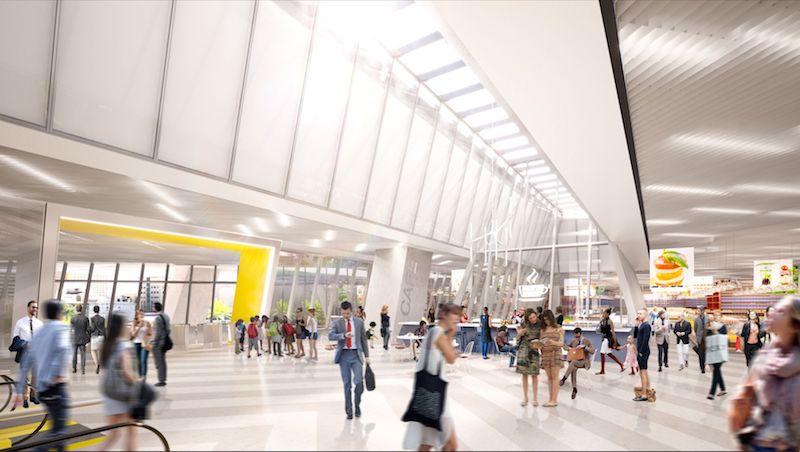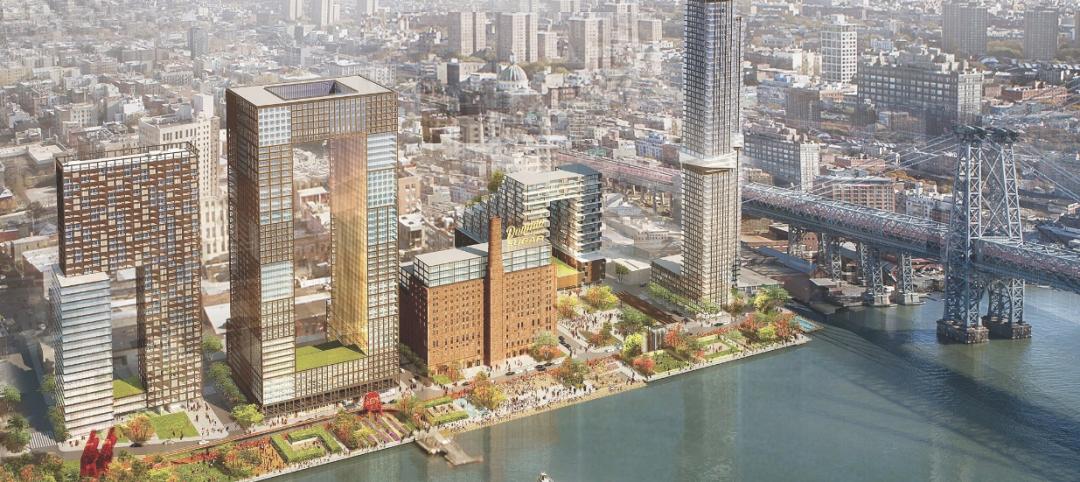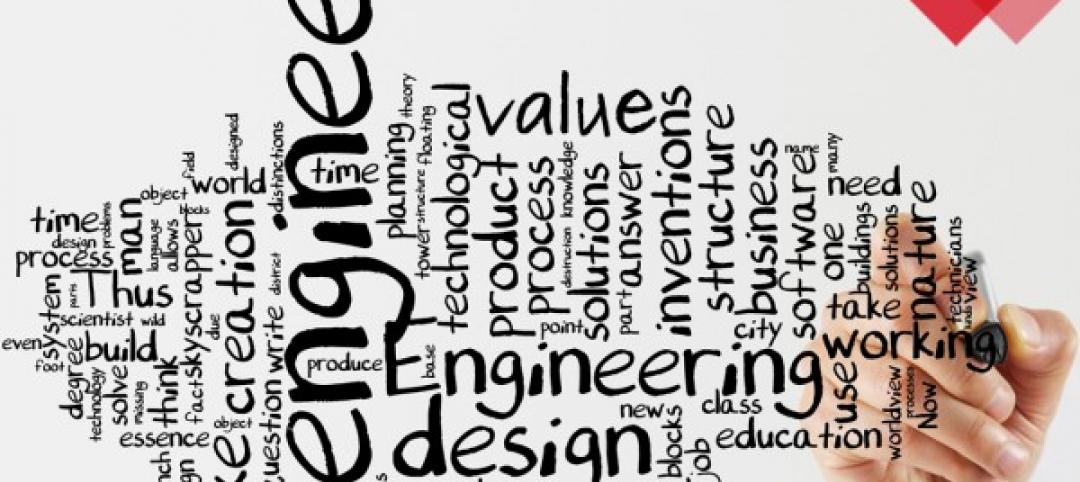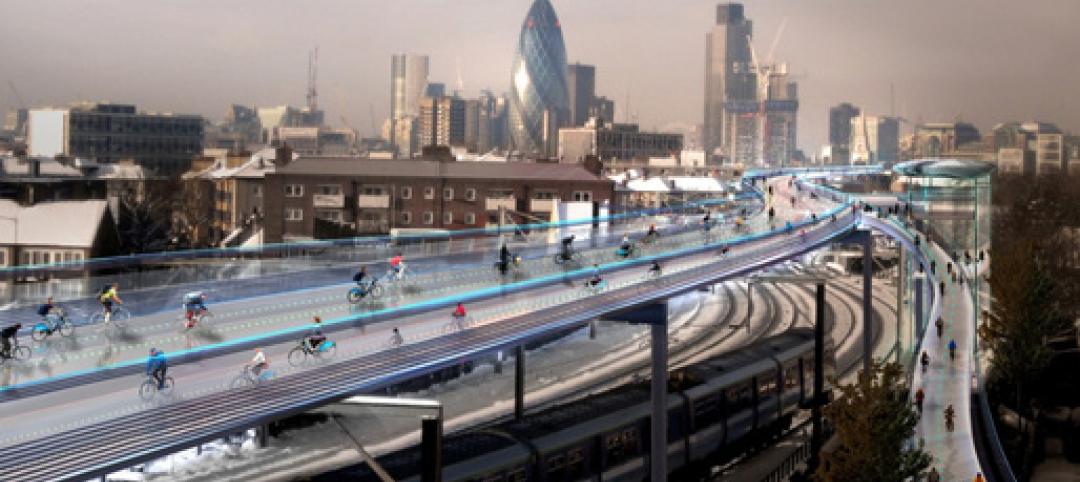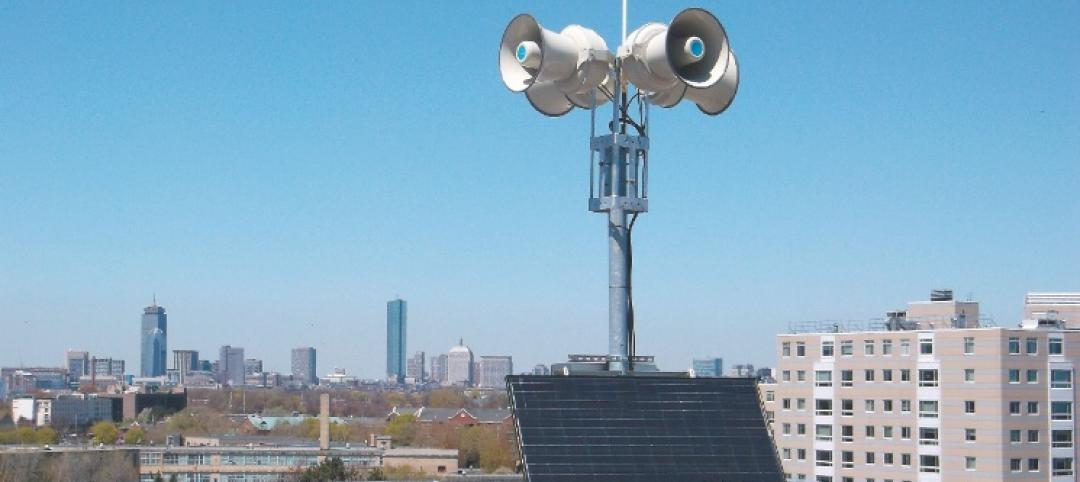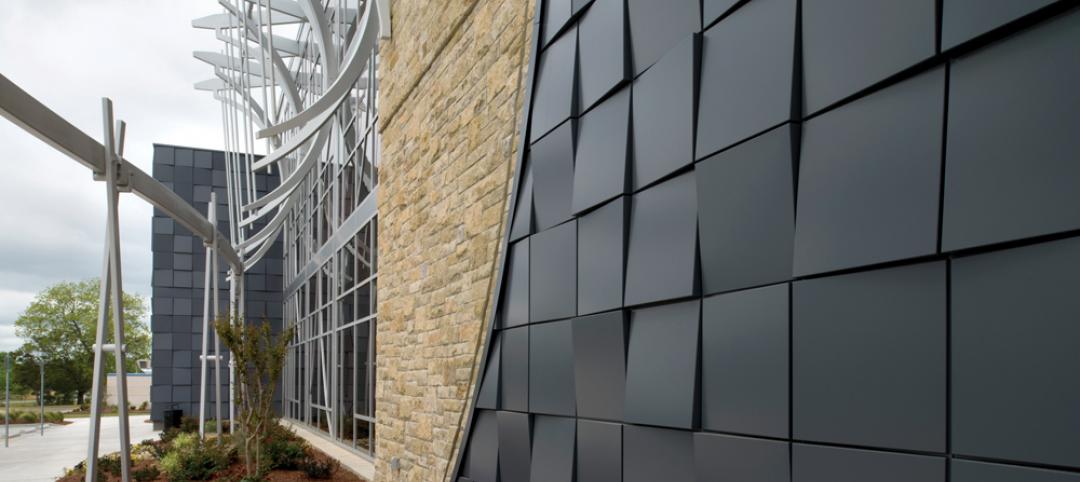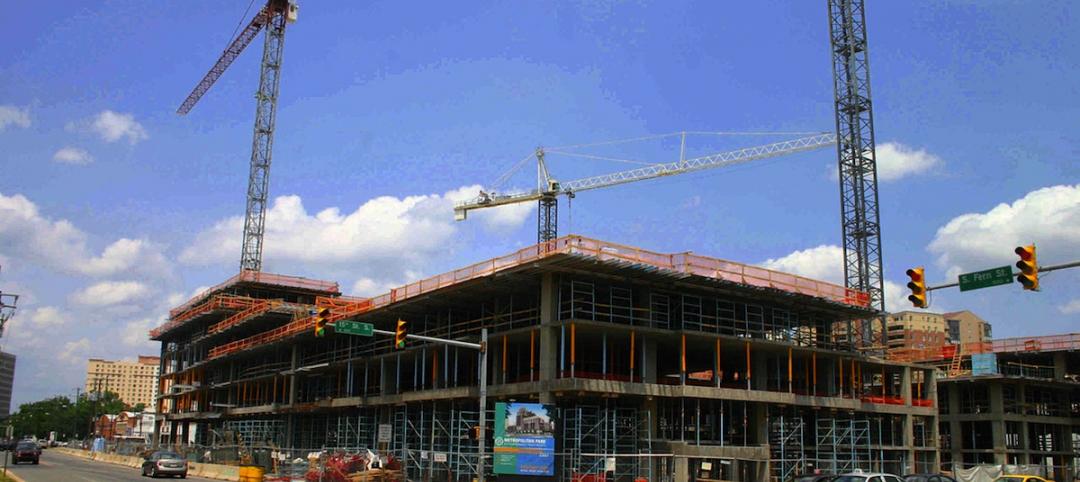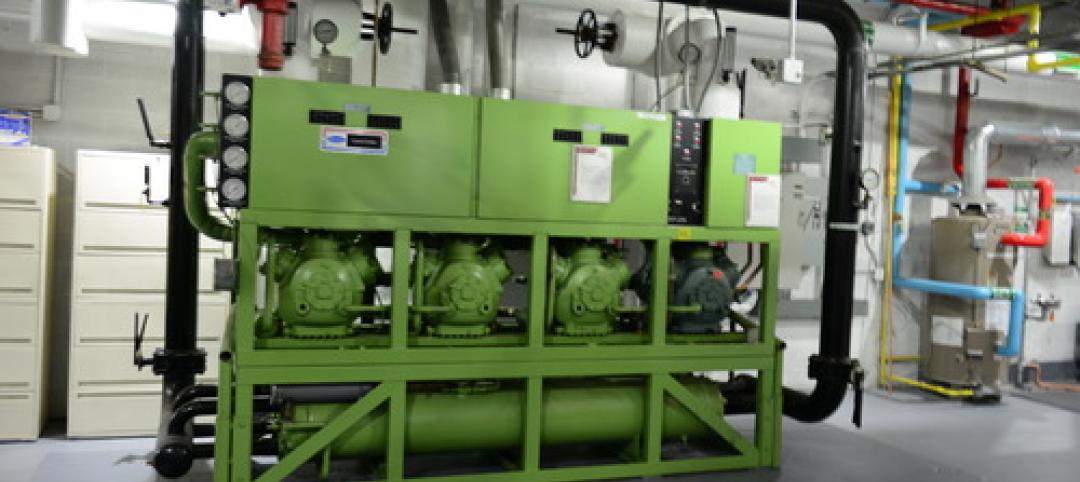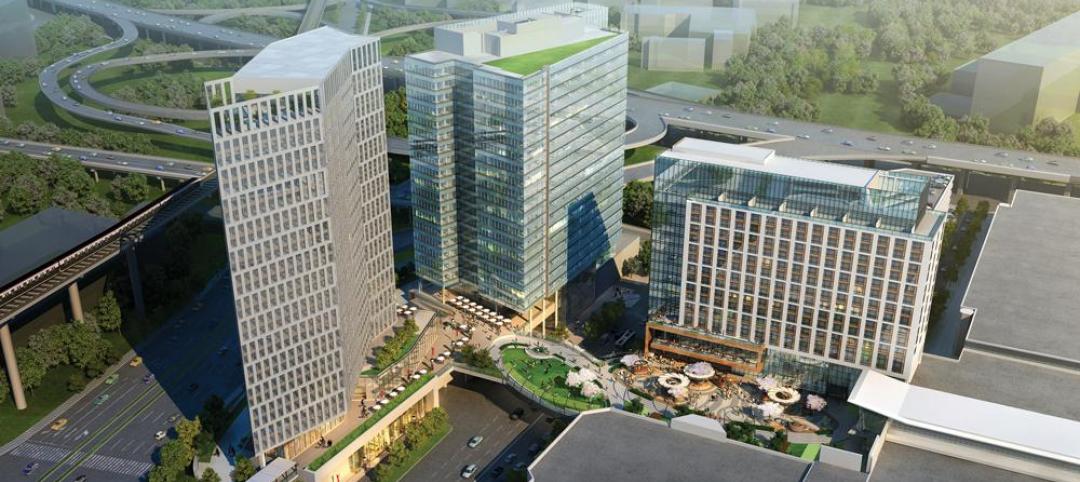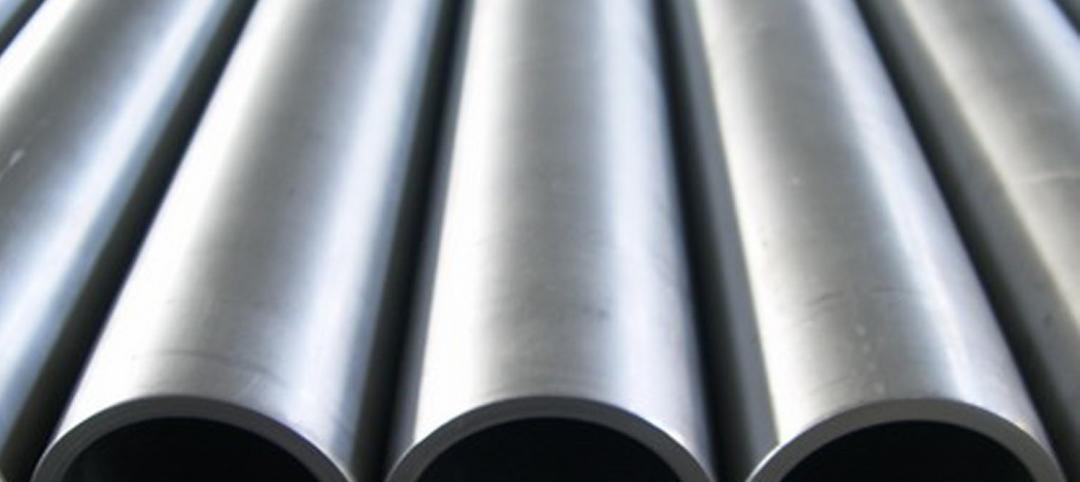Last month, All Aboard Brightline, Florida’s hospitality focused high-speed intercity passenger rail service, extended its service to MiamiCentral, a new 200,000-sf terminal on 11 acres in downtown Miami.
MiamiCentral is part of the only privately owned, operated, and maintained intermodal development in the U.S. Brightline’s rail system now includes nonstop service from Miami to a 27,500-sf station on 4.8 acres of land in downtown Fort Lauderdale, and a 60,000-sf station in downtown West Palm Beach, Fla. The Fort Lauderdale and West Palm stations opened on January 13.
All Aboard Brightline intends to expand this system’s service to Orlando eventually. According to a recent study by the Washington Economics Group, the Brightline rail system is projected to attract more than $6 billion in investments in Florida’s economy by 2022.
All Aboard Brightline secured state approval to sell bonds to pay for this project, whose cost is estimated at $3 billion. All Aboard Brightline is part of Florida East Coast Industries, a Coral Gables, Fla.-based holding company invested in real estate and transportation, with more than $46 billion in infrastructure assets under its management.
MiamiCentral is, in fact, a mixed-use development that spans six downtown blocks. It includes Two MiamiCentral, a 195,000-sf office tower that is scheduled to open late this year; and Three MiamiCentral, a 90,000-sf office tower with 35,000 sf of retail, that opened last December. (Yesterday, The Real Deal reported that Viacom had recently leased 24,000 sf on the 12th floor of Three MiamiCentral, which is now at 95% occupancy.)
The complex will eventually include 1.43 million sf of residential, which is scheduled to open next year.
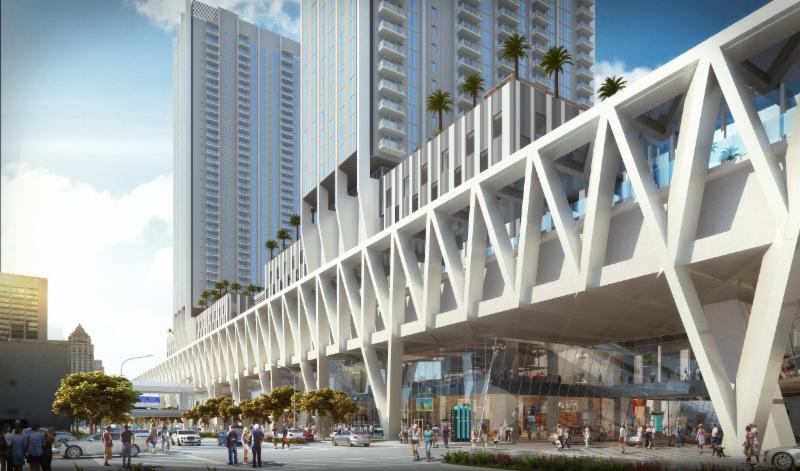
The 200,000-sf MiamiCentral station is elevated 50 feet above street level, where there's leased space for retail. Image: Smilodon GC
The MiamiCentral train station and its platforms are elevated 50 feet in the air in response to the density of the site. Street-level retail spaces are beneath the tracks. Elevated parking garages are situated above the rails and lift vehicles by elevator. A pool and green space sit atop the garage and in between the towers. “What makes the design unique is that it flips the idea of the traditional train station,” says Roger Duffy, FAIA, NCARB, Design Partner on the project. “We built the railway above grade to avoid interfering with existing street flow and, if you dig too deep under Miami, you hit the water.”
Duffy works for Skidmore, Ownings & Merrill, which in association with Florida-based Zyscovich Architects designed the three stations. Rockwell Group designed the interior check-in areas, food and beverage areas that are operated by Brightline, and lounges. Suffolk Construction was the GC on the Miami station, and Moss & Associates built the West Palm Beach and Fort Lauderdale stations.
For MiamiCentral, SOM converted the site of a former 1920s train station—which had been used for decades as a parking lot—into a 21st Century terminal. Commuters can use an app to book their trips and check train schedules. The trains themselves offer riders a baggage rack, bike rack, seating area tabletop electrical outlets, and bathrooms.
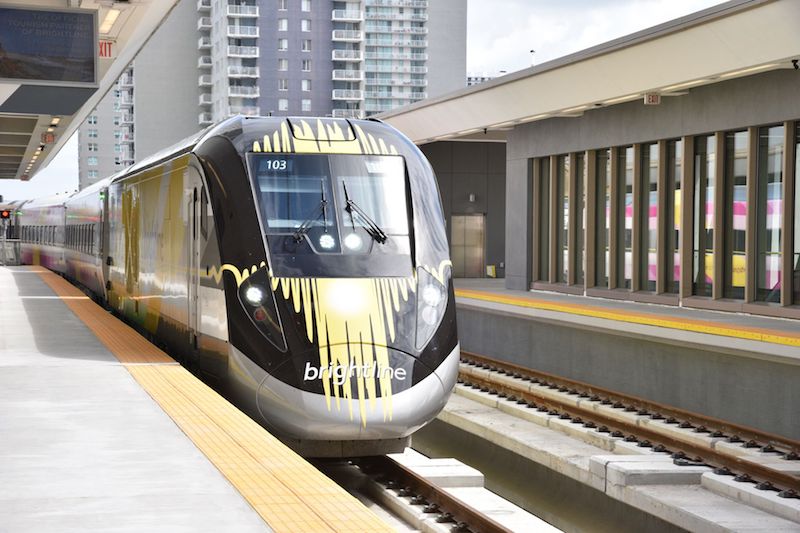
All Aboard Brightline intends to expand its service into Orlando eventually. One study estimates that the new rail system could attract more than $6 billion in new investments. Image: Brightline
One of SOM's primary design objectives was to create a sense of overall unity for the entire transportation network, while conveying a sense of identity for each station. SOM unified the stations' designs by exposing their structural forms—V-shaped bracing—as the main architectural expression, and by bringing in natural light through ample use of glass.
The Fort Lauderdale station rises above surrounding buildings and features a sequence of stacked glass boxes that provide a visual connection to the city. The West Palm station is sheathed in a glass façade, and its departure lounge is suspended 30 feet above the train platform.
Olin McKenzie, AIA, NCARB, Director at SOM, says the intention of this project is to “create new districts in these cities.”
Related Stories
Smart Buildings | Jan 7, 2014
9 mega redevelopments poised to transform the urban landscape
Slowed by the recession—and often by protracted negotiations—some big redevelopment plans are now moving ahead. Here’s a sampling of nine major mixed-use projects throughout the country.
| Jan 6, 2014
What is value engineering?
If you had to define value engineering in a single word, you might boil it down to "efficiency." That would be one word, but it wouldn’t be accurate.
| Jan 3, 2014
Norman Foster proposes elevated bikeways throughout London
Called SkyCycle, the plan calls for the construction of wide, car-free decks atop the city's existing railway corridors.
| Dec 13, 2013
Safe and sound: 10 solutions for fire and life safety
From a dual fire-CO detector to an aspiration-sensing fire alarm, BD+C editors present a roundup of new fire and life safety products and technologies.
| Dec 10, 2013
16 great solutions for architects, engineers, and contractors
From a crowd-funded smart shovel to a why-didn’t-someone-do-this-sooner scheme for managing traffic in public restrooms, these ideas are noteworthy for creative problem-solving. Here are some of the most intriguing innovations the BD+C community has brought to our attention this year.
| Nov 27, 2013
Wonder walls: 13 choices for the building envelope
BD+C editors present a roundup of the latest technologies and applications in exterior wall systems, from a tapered metal wall installation in Oklahoma to a textured precast concrete solution in North Carolina.
| Nov 26, 2013
Construction costs rise for 22nd straight month in November
Construction costs in North America rose for the 22nd consecutive month in November as labor costs continued to increase, amid growing industry concern over the tight availability of skilled workers.
| Nov 25, 2013
Building Teams need to help owners avoid 'operational stray'
"Operational stray" occurs when a building’s MEP systems don’t work the way they should. Even the most well-designed and constructed building can stray from perfection—and that can cost the owner a ton in unnecessary utility costs. But help is on the way.
| Oct 30, 2013
11 hot BIM/VDC topics for 2013
If you like to geek out on building information modeling and virtual design and construction, you should enjoy this overview of the top BIM/VDC topics.
| Oct 18, 2013
Researchers discover tension-fusing properties of metal
When a group of MIT researchers recently discovered that stress can cause metal alloy to fuse rather than break apart, they assumed it must be a mistake. It wasn't. The surprising finding could lead to self-healing materials that repair early damage before it has a chance to spread.


